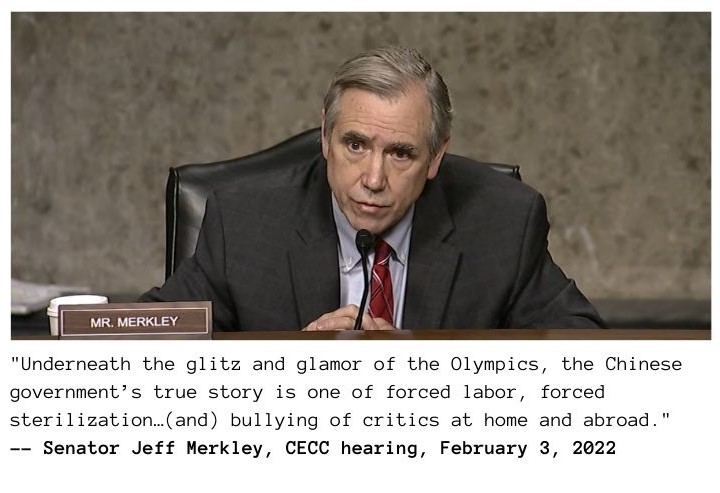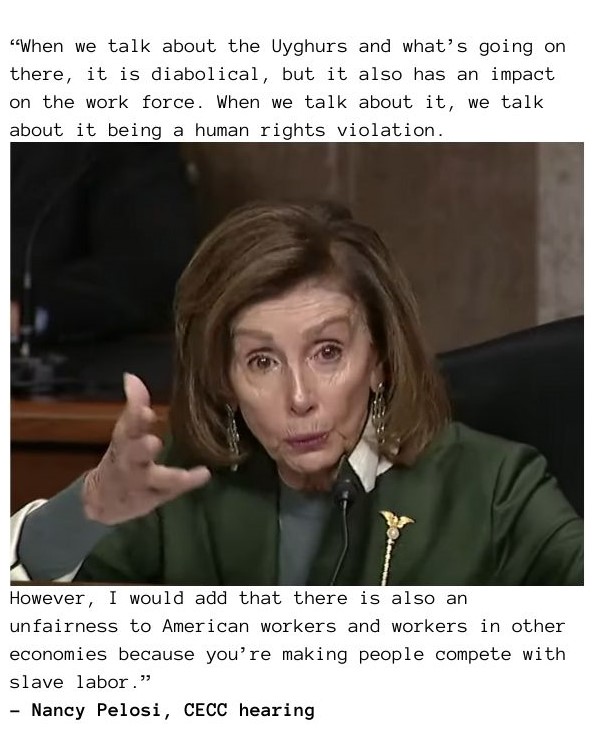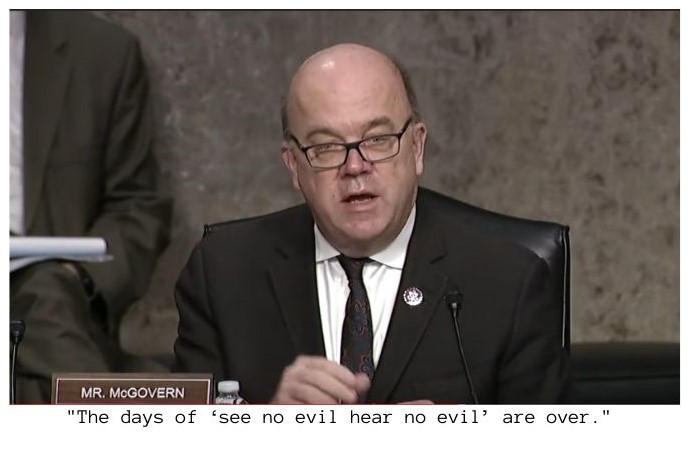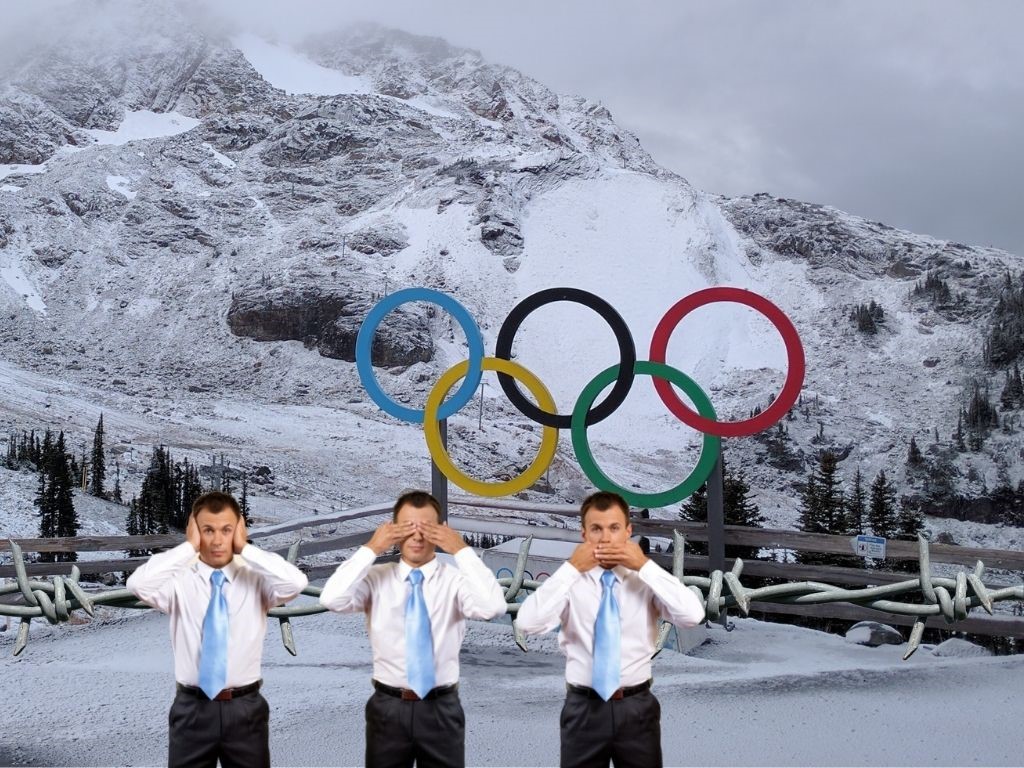On February 3, 2022, on the eve of the Winter Olympics in Beijing, the Congressional-Executive Commission on China (CECC) heard from five panelists about China’s repression of its people. Some 24 hours later, a Uyghur Muslim woman was allowed to be one of the Olympic torchbearers, signaling to the world that the Uyghurs are alright, and so is China. There’s no genocide in the Uyghur province of Xinjiang, as the U.S. State Department saw it. That was the message Beijing was sending.
In Washington, that message went straight to spam.
The Commission’s conversation last week centered around exiled and imprisoned Hong Kongers, Tibetans separated from family due to political persecution, and, of course, the Uyghurs and other Muslims in Xinjiang living in an Orwellian police state.
It was a somber two hours. The panelists at times held back tears, appeared frustrated, angered, and sometimes at a loss for words to describe how they felt. Being ignored by the International Olympic Committee – an institution no one seems to have trust in – seemed an accepted fate to them. But being ignored by the likes of American brands like Coca-Cola and AirBnB, sponsors of the Beijing 2022 games, is what really bothered them all.
CPA’s National Security Advisor Robby Smith wrote about the Olympic sponsors in an op-ed published in The Washington Times on January 29.
Rep. Chris Smith (R-NJ-4) said the Olympic sponsors were “complicit” in the airing of what many have dubbed the Genocide Games. “They are subsidizing Xi Jinping’s propaganda extravaganza,” he said.
Corporate America was called out on the carpet by the Congressional-Executive Commission on China and many of its panelists for their complicity in funding, aiding and abetting the rise and the increasing might of the Chinese Communist Party.
Commission Chairman and Senator Jeff Merkley (D-OR) said the Commission spoke with the IOC about moving the games. They also sent letters to broadcasters and sponsors of the Olympics. Whatever they said, they didn’t achieve the longshot they had hoped for.
Coca-Cola will never call out China’s human rights violations during the Olympics. Airbnb is unlikely to issue a press release saying it is taking down its listings in Xinjiang.
 Bullying of critics includes corporations like Nike, boycotted immediately for saying they would go along with a U.S. decision by the Customs and Border Protection Agency to ban Xinjiang cotton from American supply chains.
Bullying of critics includes corporations like Nike, boycotted immediately for saying they would go along with a U.S. decision by the Customs and Border Protection Agency to ban Xinjiang cotton from American supply chains.
Anta, the third-largest sports apparel maker, and a Chinese multinational, said it would continue to source cotton for its clothes in Xinjiang. They know better than to risk the ire of the CCP.
“Our criticism is not directed at the Chinese people or Chinese Americans. Our work at the Commission is based on human rights standards, grounded in law. These athletes have trained for years, and it may be their last or only shot at a medal and their participation should be uncomplicated by the host nation. When the IOC awarded the winter Olympics to Beijing it was already a human rights violator. Now it is even worse. We asked the IOC to relocate, but they refused. We asked U.S. corporate sponsors not to sponsor so these athletes wouldn’t have genocide as the backdrop; they refused. If given a choice, I bet no athlete in the world would want to compete in a country committing genocide, but that is what they are forced to do because of the IOC and its feckless corporate sponsors.” – Rep. Jim McGovern, Co-Chair, Congressional-Executive Commission on China, Feb. 3, 2022.
Coca-Cola and other sponsors told the Commission that if they spoke up in any capacity about political prisoners and human rights matters in Xinjiang, they could lose market share in China.
“This is wrong,” said Commission co-chair Jim McGovern (D-MA-2). “This has to change. These companies are going to have to figure out a way,” he said, adding he does not drink Coca-Cola anymore as a matter of personal protest.
House Speaker Nancy Pelosi spoke twice during the hearing. Pelosi helped push the Uyghur Forced Labor Prevention Act to the White House. It is now law and goes into effect this summer. She was also a proponent for banning U.S. foreign service workers, politicians and staff from going to the Olympics.
“If we do not speak out against human rights violations in China, we lose all moral authority to speak out against human rights violations anywhere,” Pelosi said. “It is hard to fathom how the IOC could choose China, but they have.”
Pelosi’s comments at the Commission, regarding her advice to athletes to keep quiet on China politics, made the rounds on social media. She was not kowtowing to the CCP. Or censoring for them ahead of time.
“Do not risk incurring the anger of the Chinese government because they are ruthless,” Pelosi said. “I worry about what the Chinese government might do. There are no good intentions on the part of the People’s Republic of China. Do not assume there are any.”
That’s a message some in the business community should ponder, too.
Pelosi said both parties agree on China and human rights. This is a headwind for corporates who think a return to a pre-trade war status quo relationship with China is days away.
“I would say to the business community as they demonstrate their cowardice…what worth is there in gaining the market but losing your soul?” she said, looking quite sincere. “We don’t want that to happen to us. This is a challenge to the conscience of the world.”
 Pelosi said American businesses were capitulating to the CCP. They are ignoring the political and social ramifications, and business risks, of their decisions.
Pelosi said American businesses were capitulating to the CCP. They are ignoring the political and social ramifications, and business risks, of their decisions.
Panelists agreed.
Yaxue Cao, Founder and Editor of China Change:
“China has gotten used to foreign companies bowing to its demands. To eat at the CCPs pig trough, you will have to turn into a pig..and turn away your principles. It is time we take a hard look at the way we strike deals with the CCP in China.”
With the Olympics in mind, Cao gave an example of how the Women’s Tennis Association said it will no longer host tennis matches in China until they can hear from Peng Shuai, a tennis star who first said she was sexual assaulted, then vanished, and is now retracting her story as if nothing happened. The WTA signed a 10-year contract with China to hold season finals in Shenzhen. They have yet to back down from wanting to speak with Peng in person. CCP is not in favor of this.
Cao thinks that once the Olympics ends, China will “try and bring WTA to its knees” and get them to return to China and swallow the Peng confession, a confession Cao believes is coerced. China likes to roll out for TV cameras those critical of the government who retract their statements and make public apologies about the misunderstanding.
Jewher Ilham, Uyghur, exiled:
“You should assume anything made in Xinjiang is tainted by forced labor. If a company says that their product doesn’t include forced labor…they are pretending they don’t know what’s going on or lying to you. The IOC’s Olympic uniforms are made by Anta and HYX and they admit to using Xinjiang cotton. How can two brands that say they use Xinjiang cotton be considered free of forced labor? They disclosed no information on their supply chain to the IOC. And the IOC still used them.”
Nathan Law, Hong Kong student activist, exiled:
“To see foreign corporations rolling out the red carpets for China is disgusting. There is nothing to celebrate about the Beijing Olympics while a genocide is happening.”
Two women, Nyima Lhamo from Tibet, and Sophie Luo from mainland China, also spoke. Nyima lives in exile and her family was captured by Chinese police forces for a week, asking for her whereabouts. Sophie’s husband, a human rights lawyer named Ding Jiaxi, has been in jail since 2019. Like Ilham, none have close contact with their family members. Ilham said she does not know if her father is alive.
Such is the climate in Xinjiang, home to Tesla dealerships, Volkswagen assembly lines, Goldwind Science & Technology wind turbines (44 of which were installed in the U.S. in 2020), and Airbnb listings.
The U.S. has bans on numerous Xinjiang companies and product lines. This includes an outright ban on all things made from Xinjiang cotton, as well as a ban on Hoshine Silicon Industry Co, makers of polysilicon used in semiconductor and solar manufacturing.
The Uyghur Forced Labor Prevention Act will make it more difficult for companies to do business in Xinjiang or with minority forced labor throughout China. The presumption of guilt will be put on any company sourcing from the province unless they can prove their supply chain is free of prison labor. But it does not penalize other forms of corporate support for the CCP, their atrocities, and those profiting off of the multiplicity of business malpractice opportunities throughout China – including forced labor – aside from direct import of goods.
McGovern wrapped up with a warning for American companies in China.
 “We will make sure the Uyghur Forced Labor Prevention law is enforced,” McGovern said. “The days of ‘see no evil, hear no evil’ are over. The corporations who have turned a blind eye to what is happening to the Uyghurs and others…are complicit,” he said. “We are speaking in very strong terms here, but it is true. I get it that everyone wants to make money. But the bottom line is this: we are going to make Americans know which companies are complicit so consumers can make choices based on that.”
“We will make sure the Uyghur Forced Labor Prevention law is enforced,” McGovern said. “The days of ‘see no evil, hear no evil’ are over. The corporations who have turned a blind eye to what is happening to the Uyghurs and others…are complicit,” he said. “We are speaking in very strong terms here, but it is true. I get it that everyone wants to make money. But the bottom line is this: we are going to make Americans know which companies are complicit so consumers can make choices based on that.”
As China’s Olympics Begin, A Reminder Who is Helping Build the CCP Frankenstein Monster












